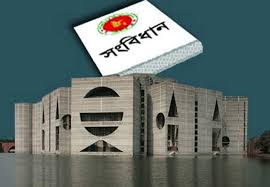Published: / Times Read

The Constitution Reform Commission has proposed four new core principles for the Constitution and state principles: "Equality, Human Dignity, Social Justice, Pluralism, and Democracy." This proposal reflects the ideals of the 1971 Liberation War and the aspirations of the 2024 mass uprising.
On Wednesday (January 15), the commission, led by Professor Ali Riaz, submitted a summary of their recommendations to the Chief Adviser. The report includes suggestions for constitutional reforms that aim to establish a functional democracy, ensure fundamental human rights, and institutionalize accountability.
The seven key areas of focus for the Commission are:
New Core Principles for the Constitution:
The Commission proposes that the core principles of the Constitution and state be "Equality, Human Dignity, Social Justice, Pluralism, and Democracy," reflecting the ideals of the 1971 Liberation War and the aspirations of the 2024 mass uprising.
Establishment of Institutional Power Balance
Reduction of Executive Power of the Prime Minister
Clear Proposals for Interim Government Structure
Decentralization of the Judiciary
Ensuring a Strong Local Government System
Expansion of Fundamental Rights and Constitutional Protection
The Commission recommends replacing the terms "Republic" and "People’s Republic of Bangladesh" in the Constitution with "Civility" and "People’s Democratic Republic of Bangladesh." However, the English version will retain the terms "Republic" and "People's Republic of Bangladesh."
The state language of Civility will be "Bangla." All languages used as mother tongues by citizens in Bangladesh will be recognized as official languages of the country.
The Commission recommends the removal of the provision in the Constitution that defines citizenship as "Bengali" and replacing it with the term "Bangladeshi" for all citizens of Bangladesh.
The Commission also proposes the repeal of Articles 7(k) and 7(l) related to constitutional offenses and amendments.
The Commission suggests including the following new principles in the Constitution: Equality, Human Dignity, Social Justice, Pluralism, and Democracy.
A new provision should be added reflecting Bangladesh’s pluralistic society, stating: "Bangladesh is a pluralistic, multi-ethnic, multi-religious, multi-lingual, and multi-cultural country where coexistence and respect for all communities will be ensured."
The Commission proposes removing the current provisions in the Constitution related to secularism, socialism, and nationalism (Articles 8, 9, 10, and 12).
Proposal for a Unified Charter: The Commission recommends combining the existing rights in Parts II and III of the Constitution into a single "Fundamental Rights and Freedoms" chapter. This would be enforceable in courts and would address the disparities between economic, social, cultural, civil, and political rights.
New Rights: The Commission recommends adding new rights, including:
Rights to food, education, healthcare, housing, internet access, information, voting, privacy, consumer protection, children's rights, development, science, and rights for future generations.
Reforms to Existing Rights:
Expanding the list of prohibited discrimination.
Ensuring protection against extrajudicial killings and enforced disappearances.
Including the right to bail and the abolition of arbitrary detention.
General Limitation on Rights: A general limitation clause will be added, which will apply to all fundamental rights, with provisions for testing balance and proportionality.
Effective Implementation of Rights: Rights that require significant resources, such as education, healthcare, and housing, will be implemented progressively according to resource availability.
Bicameral Legislature Proposal: The Commission proposes a bicameral legislature, consisting of a lower house (National Assembly) and an upper house (Senate). Both houses will serve for four-year terms.
The lower house will be composed of members directly elected by a majority vote. There will be 400 seats, with 300 members elected from regional constituencies and 100 women members elected through direct vote from designated constituencies.
Political parties must nominate at least 10% of candidates from youth groups for the lower house elections.
The minimum age for candidates to contest parliamentary elections will be reduced to 21.
Two deputy speakers will be appointed, one of whom will be nominated from the opposition.
No member of the lower house can hold more than one position simultaneously, such as Prime Minister, Leader of the House, or Party Head.
The upper house will consist of 105 members:
100 members will be elected based on proportional representation (PR) from the national vote.
At least 5 members will represent socially and economically disadvantaged communities.
The remaining 5 seats will be filled by the President, who will nominate non-political individuals.
A party must secure at least 1% of the national vote to qualify for representation in the upper house.
Any constitutional amendment will require a two-thirds majority in both houses. Once passed, the amendment will be put to a public referendum, and the result will be decided by a simple majority.
Any international treaty affecting national interests or state security must be approved by a majority vote in both houses of the legislature before it is signed.
The President can be impeached for treason, serious misconduct, or constitutional violations. The process begins with a proposal in the lower house and, if passed, proceeds to the upper house for hearings and final decision.
The Commission proposes that the leader with the majority support in the lower house should form the government. The executive powers of the state will be vested in the Prime Minister and the Cabinet.
The President will retain some specific duties, but for all other matters, the President will act according to the advice of the Prime Minister.
A National Constitutional Council (NCC) will be formed to ensure transparency and accountability in state activities and maintain a balance between state organs.
The NCC will consist of representatives from all branches of the state:
The President
The Prime Minister
The Leader of the Opposition
The Speaker of the Lower House
The Speaker of the Upper House
The Chief Justice
The Deputy Speakers of both Houses nominated by the Opposition
The members nominated from the majority vote of the legislature.